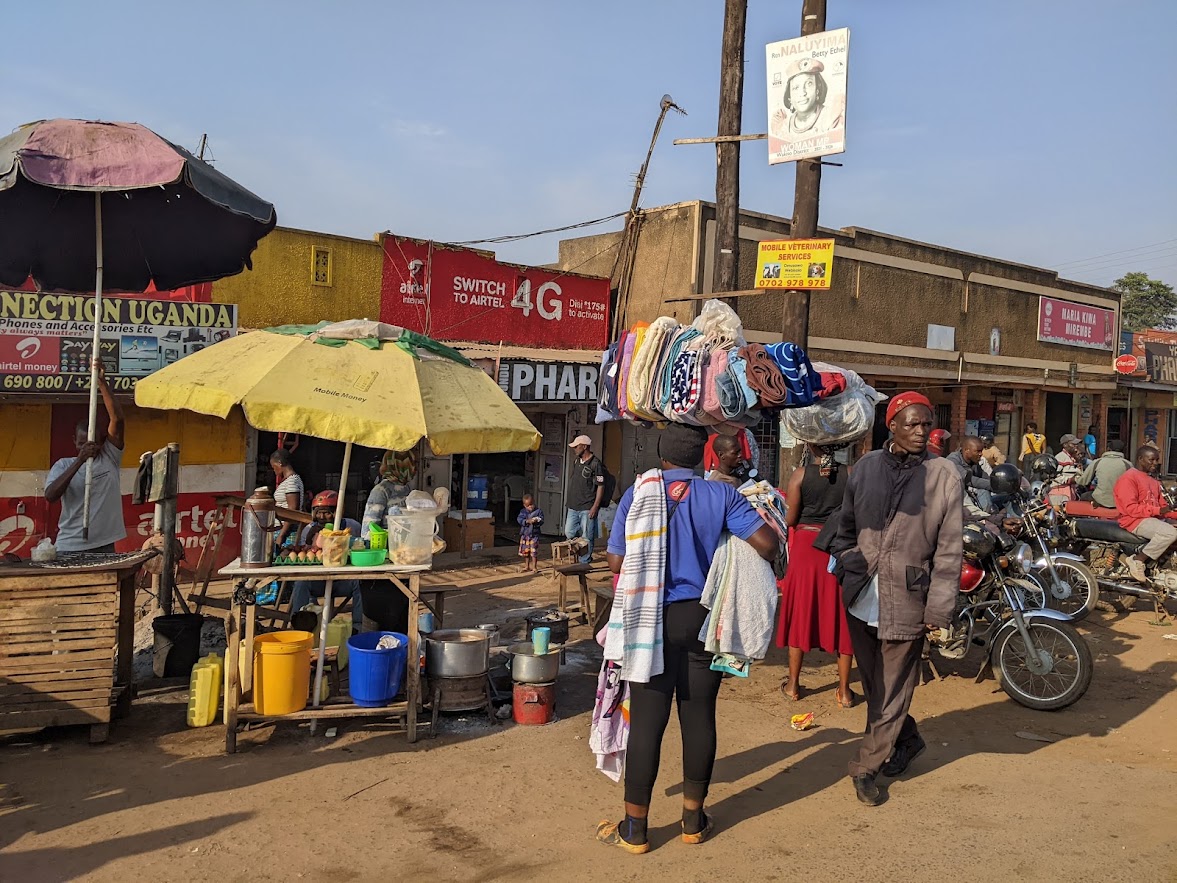It’s hard to believe that Nadine, the fantastic agent from Safari Specialists who has been helping me put together the nucleus of this trip for the last two and a half years, isn’t involved anymore. Her job is finished — I’ve gone all the places she arranged for me to go; I have had a breathtakingly wonderful time, and now I move on to the next step. These few days, however, are a transitional period. They’re for taking care of business between the first stage of my African adventure and the second, just as I had a few days in Johannesburg to take care of business before I began stage 1.
The day before yesterday, I left Jack’s Camp by one of the small bush planes. It wasn’t a good trip; there was a lot of turbulence, and turbulence in a small plane makes me panicky. Because my fellow passenger had paid extra for a direct flight to the Delta, we dropped him off first even though Maun was on the way, and then backtracked another twenty minutes to drop me. But the pilot was very kind, flying low because it made me less nervous, as if it were a scenic flight rather than one for transportation, and that really helped. I made it through… and after a stop at a nearby clinic to get the mandatory Covid test for entrance into Uganda, I was rewarded with a relaxing night at a lovely little place in Maun called the Waterfront Guesthouse.

The name, in a landlocked country, sounds a little odd at first, but there is a river which flows right behind the inn, and that’s the water they mean. The Waterfront is owned by a gentleman named Patrick and his family, who live in a small house directly near door, so they can be summoned anytime if somebody needs them. I remember when I drove across North America, fifteen years ago or so, there were a lot of little inns across the Midwest like that… family owned, with the family’s residence attached or right nearby so that they could stay at home, but be reached whenever a guest wanted something.
When I checked in, Patrick asked me if I wanted them to summon the taxi back later in the evening to take me to dinner. I declined, explaining that I would rather not risk exposure to too many people when I was going to have to pass more Covid tests in order to get into the countries remaining on my itinerary. I asked instead whether there were any takeout places I might order from.
Patrick quickly confirmed that they could help me order a pizza, but suggested an alternative after consulting with his wife: she offered to cook for me on the premises if I preferred. I gratefully accepted, and so I was fed a tuna pasta dish with homemade bread (their daughter bakes it) and a salad. It was homelike and excellent — just what I wanted after two weeks of very good resort food, but resort food rather than home cooking. This was classic comfort food, delicious and filling. And they charged me less for it than I probably would have paid for my pizza.
Patrick and his family showed a pattern I’ve seen in the tourism industry all over Africa, so far: a polite but firm insistence on making my problems into their problems, and then solving them for me as well as they can. I can honestly say that I’ve never had better — and certainly never more genuinely caring! — service anywhere in the world. The lady I literally never even met, but who made my dinner for me so I wouldn’t have to go out among strangers, and the pilot who changed his flight plan to make me feel better, were both examples of this kind of thinking. So was the gentleman I encountered at Tambo Airport, whose real job was something to do with directing people from their plane to the correct desks and making sure they had their paperwork… but who, when I asked him about where to get the wheelchair that was supposed to have turned up and never did, went personally to get one for me, and then personally pushed me halfway across the airport to my second gate.
Not everything works smoothly in Africa. I’m writing this in a Uganda hotel whose power is out right now. But when it doesn’t, they often make up for it with a human kindness that does as well as or better than effective systems would have done.
With the aid of the young man who dropped everything to find me a wheelchair and take me to my gate, I survived Tambo. He treated me as an elder, which I admit I’m not used to. I often present as a little younger than my actual age, and while that no longer quite means I look like I’m in my early thirties, it doesn’t usually make me look like an old lady, either. But this young man called me Mom, and told me that he had to take care of me, because it’s only right to take good care of your elders. When I saw that it really mattered to him I leaned into it, telling him he was a good young man, and his mother should be proud of him. And I blessed him before he left me there (which I sometimes do anyway when thanking somebody for a great help, but I was more conscious of it this time). He wasn’t wrong about my age, after all; I could indeed have had a son his age if I had borne my children young, since I’m 52 and he looked about 30. I didn’t mind, I was just bemused.
The flight to Entebbe was rough. First of all, I had six hours of waiting time in Tambo Airport before it even began. Then it was right on the edge between the length that I can tolerate in economy and what I have to do in business class. I flew this one in economy, but it wasn’t much fun.
The flight itself was five hours between 8:30 at night and 2:30 in the morning (with one time zone difference), with a lot of turbulence, and much more crowding than I had originally expected. When I boarded, there were only four people waiting for that flight… but after I got on they just kept coming until it was about 4/5 full! It was like the reverse of a circus clown car — instead of wondering how many more people could possibly come out of it, I was left wondering how many more people were going to get on?!? They must all have arrived at the gate at the last minute or something. Anyway, I got somebody sitting next to me at first, but when she started coughing (with her mask casually positioned below her nose) I nervously pinged the flight attendant, and I was allowed to move back to a pair of seats by myself. Meantime — and afterwards — I kept my mask sealed very tightly around so many people, and therefore didn’t have anything to eat or drink on the plane.

So I arrived in Entebbe exhausted, hungry, dehydrated and rather weak. Here again, the African tendency to compensate for poor systems with overwhelming individual kindness worked in my favor. The process for getting your mandatory Covid test and going through immigration was hopelessly confused and confusing; but two gentlemen who worked at the airport — one my wheelchair attendant; the second, a friend whom he roped in to help — took care of a lot of it for me and shepherded me through the rest. On occasion their methods made me slightly nervous, as when the wheelchair attendant took my passport with him to go handle something on my behalf, leaving me with no idea when he’d come back with it. But I decided to trust him, and it turned out that I was right to do so.
When we finally got out of the airport (with all my baggage intact, this time) it was after 3:30am. My guide for the next two weeks was waiting for me there. His name is Innocent, and he seems very nice and conscientious about taking care of me — rather like Musa, in a lot of ways, which is just what I want for my driver and overall guide on this trip.

I’ve been thinking a lot about the guides I’ve had so far. Musa is very much a people person; he will always take great care of his clients and he can tell fascinating stories about the people and history of Zimbabwe. But I didn’t see nearly as much wildlife with him as I did with TJ. TJ is the perfect guide for the Delta — he knows that wilderness as if he were part of it, which having grown up there he practically is. He takes reasonably good care of his guests, but occasionally forgets something while his mind is out there with the animals. But we saw SO much, with TJ and KP finding the animals for us.

I have been very fortunate, in that they were each what I wanted for that particular segment of the trip. Musa wouldn’t have been as good in the Delta, and TJ wouldn’t have been as good in Victoria Falls. (I’m leaving Fabio out of the analysis, not because I didn’t like his style, but simply because I didn’t experience enough of it to feel like I can describe it. Most of the places I went with him, he was transporting us to someone else who showed us what there was to see… he did do regular desert drives but I mostly had other interests when those were going on. So I never got to find out what Fabio was really like as a guide instead of as a driver.)
For this next stage, I’m looking more for a people person than a wildlife person, because there will be other guides in most locations to help me experience the wildlife. Innocent’s job is to get me from one to another, take care of me on the way, and show me whatever there is to see when nobody else is involved at that particular stop. From what little I’ve gotten to know of him last night, I think he’ll do it well.

He’s coming over later today, to go over plans for the tour with me. Tomorrow, we hit the road for Murchison Falls.
Next up, a special post: I’ve put together some of the coolest photos from my two weeks in southern Africa, that somehow never made it into the write-ups. After that, it’s on to the Uganda adventure!


Leave a Reply